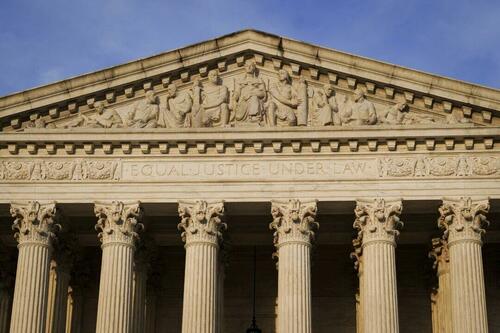Authored by Richard Trzupek via The Epoch Times (emphasis ours),
A group of recent rulings by the Supreme Court have led some to speculate that SCOTUS has opened the path to anarchy within the justice system, particularly in those cases that involve environmental regulation. I don’t believe that chaos is imminent—far from it—and will endeavor to make the case that SCOTUS has been reasonable within a Constitutional context.
 The U.S. Supreme Court in Washington, on May 12, 2023. (Madalina Vasiliu/The Epoch Times)
The U.S. Supreme Court in Washington, on May 12, 2023. (Madalina Vasiliu/The Epoch Times)For simplicity’s sake, we’ll stick to the two most important decisions: Loper Bright Enterprises v. Raimondo (Loper Bright) and Corner Post, Inc. v. Board of Governors of the Federal Reserve System (Corner Post).
Loper Bright did away with the “Chevron Doctrine” that directed the judiciary to defer to public sector experts when confronted with difficult and/or seemingly ambiguous technicalities involving statutes and regulations. Corner Post moved the bar on the six-year statute of limitations that applies when a plaintiff asserts that a particular statute or regulation causes the plaintiff to suffer undue financial (or other) harm. The court held that the six-year window does not open when the statute or regulation is enacted or promulgated, but when the plaintiff first feels the effect of the onerous action.
Taken together, one could—and many have—made the argument that Loper Bright opens the door for private sector plaintiffs to effectively push forward frivolous and downright harmful legal actions by employing legions of impressive, but entirely prejudiced, experts. The potential mass of such lawsuits could cripple the judicial system by clogging its otherwise efficient pipes. Corner Post then exacerbates the problem by allowing those in the private sector determined to do so within a far wider window of opportunity within which to dispute legislation and regulation.
While I understand the arguments, I can’t agree with them in substance, or especially in tone. Loper Bright and Corner Post are not earth-shaking decisions that would score far over a “four” on the Richter Scale of American politics. They are rather gentle tremors that reflect a healthy, but not shocking, adjustment of the public versus private sector balance. My reasoning, based on 40 years of representing the private sector in interactions with the public sector, chiefly in matters involving environmental regulation:
In my view, Loper Bright, Corner Post, et al. have restored a bit more badly needed balance between public and private interests in America, and have done so in a manner consistent with the language and intent of our Constitution.
These decisions do not represent a massive, dangerous sell-out to the private sector, nor are they an angry rebuke of the public sector and some of its policies. They rather represent what appears to be the Roberts court’s continuing effort to steer judicial accountability back toward the middle.
Views expressed in this article are opinions of the author and do not necessarily reflect the views of The Epoch Times.
Source link

